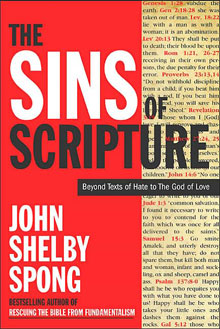Book Notes
 John Shelby Spong, The Sins of Scripture; Exposing the Bible's Texts of Hate to Reveal the God of Love (San Francisco: HarperCollins, 2005), 315pp.
John Shelby Spong, The Sins of Scripture; Exposing the Bible's Texts of Hate to Reveal the God of Love (San Francisco: HarperCollins, 2005), 315pp.
Since his retirement in 2000 as Bishop of the Episcopal Church in Newark, John Shelby Spong has fashioned himself as a leading spokesperson for a radically progressive Christianity. In a dozen or so books he has insisted that institutional Christianity must aggressively question the very essence of its faith inheritance, and not just in a cosmetic way that tinkers with the fringes. Rather, he admits that his drastic antidotes might kill the patient, although it is not clear that he would view that outcome as unfortunate (pp 58, 178). His current book is simply one more verse of this refrain. Given his unsparing and unflinching critique of a church he spent a lifetime serving, I wondered why he even wants to continue to identify himself as Christian. To be sure, his alternate proposal has at best only a tenuous connection to anything historically or theologically Christian.
I suspect that those who would like to address the very important question Spong's title purports to address will find his book disappointing. His style and tone throughout are condescending towards those with whom he disagrees (mainly anyone more conservative that he is). He categorically disparages these people as profoundly ignorant, duplicitous, repressed, and pitiable. Complex issues are oversimplified. Speculative and dubious opinions (Mary was Jesus's wife, Paul was a repressed homosexual, Judas did not exist) are offered as serious alternatives. He constantly invokes the weakest, weirdest, and most bizarre forms of arguments to dissect (straw man arguments). Finally, there is the feel of self-promotion and kitsch to this book. I mean, what are we to make of a dust jacket that includes a blurb by Bill O'Reilly of Fox News and the hype that "history will recognize Spong as one of the major change agents of modern Christianity." I tend to think of people like Spong as fundamentalist liberals.
All this is unfortunate because the ostensible subject of his book is so very important. What are we to make of the passages in the Bible itself that, upon simple reading, sound so horrible? Like God's command to exterminate the Canaanites, or the death penalty for cursing or breaking the sabbath? Paul's insinuation that homosexuality is God's punishment for improper worship? Related but slightly different, what about how so many believers have abused the Bible to support horrendous evils like slavery or genocide? Spong writes that he wants to "filter" the Bible through the sieve of contemporary knowledge; that is good and necessary. But we also need to learn to move in the opposite direction, to filter the world and all its evils through the Scriptures. Interpreting the ancient Scriptures in our contemporary world, then, is a complex task, and one is likely to find little serious help in Spong's shrill manifesto.
For a great orthodox-liberal dialogue, read the many exchanges between Tom Wright and Marcus Borg. For creedal development try Pelikan. For how and why religion becomes evil (a major theme for Spong), there is Charles Kimball. Showing very little awareness of how his own social location and theological commitments might have shaped his own thought, Spong exemplifies the dilemma of taking the Jeffersonian scissors to the text, which is that you end up with a Bible that looks remarkably like your own image.


